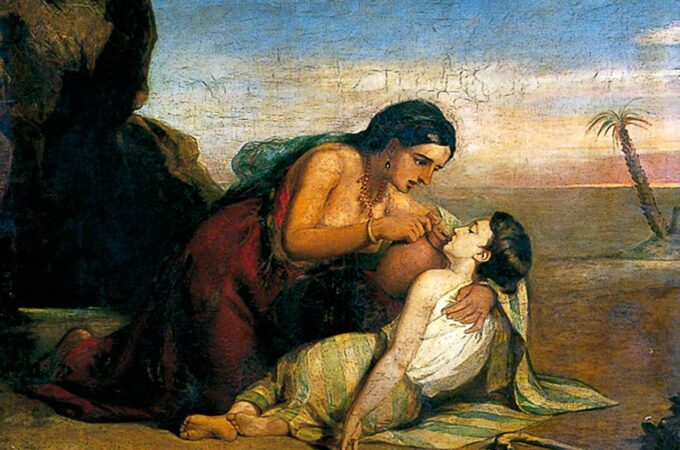Amid the crisis in the Middle East, my thoughts turned to the story of Abraham, Sarah, and Hagar in Genesis. It is from this ancient story that Arabs and Jews (and Christians in a spiritual sense) trace their descendants. Jews trace their ancestry to Isaac, Sarah’s son. Arabs trace their ancestry to Ishmael, the son of Hagar (who was Sarah’s handmaiden).
The story is well-known. When Sarah, Abraham’s wife, could not conceive, per the custom of the time she arranged for her handmaiden, Hagar, to sleep with Abraham. When Hagar conceived a son, Sarah, in a jealous rage, drove Hagar into the desert.
There are numerous things that catch our attention, but certain elements of God’s interaction with Hagar are exceptionally powerful to me (for the full biblical account, look especially at Genesis 16 and 21). Here is an excerpt from Genesis 16:7-16 (NIV, emphases added):
7 The angel of the Lord found Hagar near a spring in the desert; it was the spring that is beside the road to Shur. 8 And he said, “Hagar, slave of Sarai, where have you come from, and where are you going?”
“I’m running away from my mistress Sarai,” she answered.
9 Then the angel of the Lord told her, “Go back to your mistress and submit to her.” 10 The angel added, “I will increase your descendants so much that they will be too numerous to count.”
11 The angel of the Lord also said to her:
“You are now pregnant
and you will give birth to a son.
You shall name him Ishmael [meaning “God hears”],
for the Lord has heard of your misery.
12 He will be a wild donkey of a man;
his hand will be against everyone
and everyone’s hand against him,
and he will live in hostility
toward all his brothers.”
13 She gave this name to the Lord who spoke to her: “You are the God who sees me,” for she said, “I have now seen the One who sees me.” 14 That is why the well was called Beer Lahai Roi; it is still there, between Kadesh and Bered.
15 So Hagar bore Abram a son, and Abram gave the name Ishmael to the son she had borne. 16 Abram was eighty-six years old when Hagar bore him Ishmael.
The God Who Hears and Sees Hagar
First, in verse 8, the angel of the Lord called this slave woman by name. The God of the universe honors what the world would see as the least of people, a female slave, by addressing her personally and calling her by name. This is a truly unique occurrence in ancient writings. Recognizing that God had heard her cry, Hagar is to name her son Ishmael to remind Hagar and the world, that God hears (v. 11).
In Genesis 16:13, Hagar identified and named God as “You are the God who sees me” (emphasis added). The God of the universe is not only infinite; He is also personal. He hears His people’s cry and sees their affliction. God heard and saw Hagar in her distress, and He responded to her. In honor of this, the well was named Beer Lahai Roi, which means “the well of the Living One who sees me” (v. 14)
These two sentiments were particularly meaningful to me after reflecting in my recent blog series about God’s concern and interest in us seeing and hearing Him in and through the person of Jesus. But not only is God interested in us seeing Him. He also wants to be sure that we understand that He sees us.
A Numerous People
A notable prophecy in this text is that Hagar’s descendants will be “too numerous to count” (v. 10). We have seen the fulfillment of this. From this poor, humble slave woman came the historic line of Ishmael, a son of the Patriarch Abraham, and a great nation of peoples. Ishmael’s descendants, the Arabs, are a great people in number—too numerous to be counted. In addition to the size of their population, they have made countless contributions to the world through their poetry, literature, art, architecture, math, science, technology, medicine, and pharmacology to name a few. Many people wrongly imagine that all Arab people might be Islamic jihadists, but this is not the case. I will talk more in my next blog about the connections between Islam and jihad.
Prayers in Closing
- Like Hagar, may we recognize God’s attention toward us in our daily lives—seeing and hearing us amid our needs and concerns.
- As sons and daughters of God, may we pray for, see, and hear the sons of Abraham—both Jews and Arabs who are suffering at the hands of the jihadists in the Middle East today.
- May we all “Pray for the peace of Jerusalem!” as the Psalmist urges us to do (Psalm 122:16).






